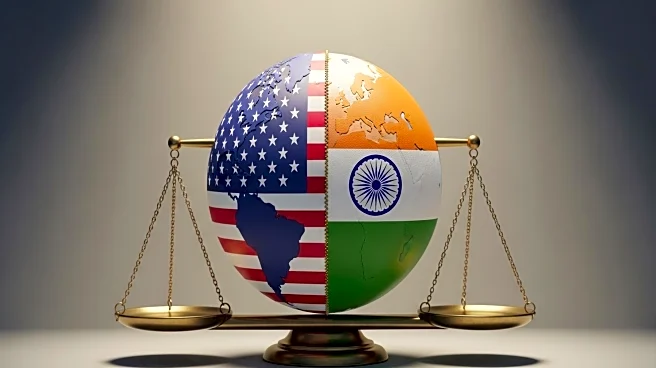What's Happening?
Relations between the United States and India have reached a new low due to a tariff dispute involving President Trump and Prime Minister Narendra Modi. The disagreement centers around trade negotiations, with President Trump imposing a 25 percent tariff on India for purchasing Russian oil. This move has resulted in India facing the highest tariff burden among U.S. trading partners, tied with Brazil. The conflict has been exacerbated by comments from Trump trade adviser Peter Navarro, who criticized India for its continued oil purchases from Russia. Despite these tensions, Modi has been working towards a trade agreement with the U.S., focusing on American access to India's dairy and agriculture markets. However, the negotiations have stalled, partly due to upcoming elections in India's agrarian state of Bihar.
Why It's Important?
The tariff dispute between the U.S. and India is significant as it could impact the long-term relationship between the two countries. India is a key player in the Indo-Pacific region, and maintaining strong ties is crucial for countering China's influence. The tariffs could strain economic relations and affect geopolitical alliances, particularly the Quad alliance involving the U.S., Japan, Australia, and India. The situation highlights the risks of President Trump's transactional approach to international relations, which may prioritize short-term gains over long-term strategic partnerships. The outcome of this dispute could influence global trade dynamics and affect U.S. efforts to maintain technological and economic dominance.
What's Next?
Prime Minister Modi's visit to China and Japan suggests ongoing diplomatic efforts to balance relations with major global powers. While Modi has expressed commitment to the Quad alliance, his interactions with China may signal a shift in India's foreign policy strategy. The U.S. and India are likely to continue negotiations to resolve the tariff dispute, but the resolution may depend on broader geopolitical considerations. The upcoming elections in India could also influence the country's trade policies and its approach to international relations. Stakeholders in both countries will be closely monitoring developments to assess the impact on bilateral trade and strategic alliances.
Beyond the Headlines
The tariff dispute raises questions about the ethical and strategic dimensions of international trade policies. It underscores the challenges of balancing national interests with global cooperation, particularly in the context of rising nationalism and economic protectionism. The situation also highlights the importance of diplomatic engagement and multilateral alliances in addressing complex global challenges. As India navigates its relationship with the U.S. and China, the broader implications for regional stability and economic growth will be closely watched by policymakers and analysts.










